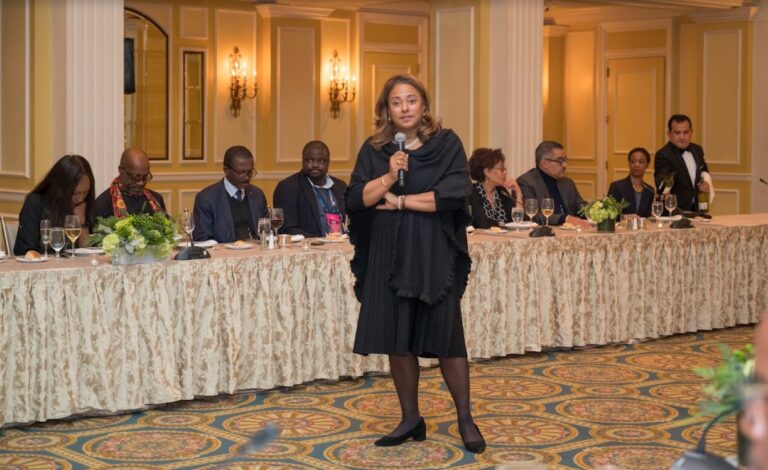During the U.S.-Africa Leaders Summit, an event titled “Innovating Finance for Climate Change” provided some of the most insightful discussions.
The event involved a highly curated group, across a wide range of disciplines, all of whom are critical to finding creative solutions to closing the gap in Africa’s need for funding for its vast demand for power. It included senior representatives from the U.S. government, the African Union, bankers, development financiers, power companies, investors, and civil society. The event was sponsored by the Africa Finance Corporation (AFC) and Bank of America (BofA), and produced by Africa.com.
The conversation among 50 participants covered much ground. A lively debate ensued between a Western climate change activist and several African practitioners around the pace at which Africa can move towards clean energy – the point being that until clean energy is readily and cheaply available, mothers will continue to chop down trees for firewood to boil water for their babies to drink.
Another probing discussion took place with a representative of U.S. equity investors who manage over $300 billion in assets. In the exploration of what it takes to get more of these U.S. investors to the table, the point was made that consultants to U.S. pension funds are critical gatekeepers to unlocking that pool of capital, and there are few among the consultants who understand the Africa investment environment.
The Africa Finance Corporation and Bank of America presented examples of innovative financing structures that their institutions have developed to bring much needed climate finance funding to Africa.
AFC & Bank of America Lead Discussion at U.S. -Africa Leaders Summit by Africa.com
AFC, who have invested over $10 billion in 37 African countries, is one of the largest investors in clean power on the continent, through a recent joint acquisition of Lekela Power, the largest renewables IPP in Africa. AFC discussed their recent strategic investment, as lead developer of a $63 million project to construct and operate a 60MW wind project in Djibouti. As a multilateral financial institution established through a public–private partnership, AFC makes investments to help Africa adapt and mitigate climate change through renewable energy generation, with an emphasis on hydropower and wind, in addition to sustainable transport and other low-emissions projects. AFC launched its Infrastructure Climate Resilient Fund in 2021, through which it intends to raise up to $2 billion over the next three years to enhance the quality of African ports, roads, bridges, rail, telecommunications, clean energy and logistics in the face of rising temperatures and sea levels due to climate change.
Bank of America leverages its expertise in finding creative solutions to green finance through its extensive experience having done so in the U.S. and emerging markets around the globe. BofA discussed their recent commitment, announced during COP27, to structure blended finance to fund commercial and industrial renewable energy and battery storage solutions across Africa. On a global scale, BofA has committed to $1.5 trillion in climate finance projects by 2030.
Bank of America has an intentional approach to deploying sustainable finance capital in the U.S. and emerging markets, focusing on transforming markets and accelerating a global shift to a low-carbon, sustainable economy. On a global scale, BofA has a goal of mobilizing and deploying $1.5 trillion in sustainable finance capital by 2030 that is aligned with the 17 UN SDGs, of which $1 trillion is dedicated to supporting the transition toward a low-carbon economy and $500 billion for social inclusive development. At COP27, BofA discussed their intention to explore financing solutions with CrossBoundary Energy’s (CBE), in an effort to scale investment in renewable energy solutions for commercial and industrial businesses across Africa. The financing solutions will support CBE’s delivery of over 200 MW of projects.
“Innovating Finance for Climate Change” took full advantage of the presence of the right people being in the same place at the same time to identify tangible ways to drive more global capital to address Africa’s enormous need for funding renewable energy. The event was helpful in showcasing blended finance structures, the role of development finance institutions in de-risking projects, and what is needed to access U.S. pension fund capital for Africa.



